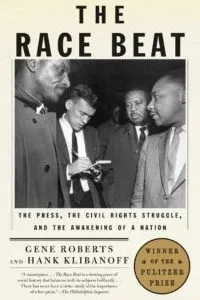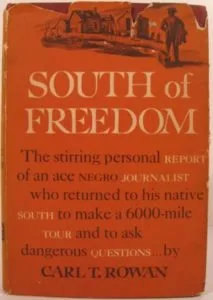
5 Great Books By Or About Black Journalists
Largely born of the abolitionist movement, the black press began in 1827 with the founding of Freedom’s Journal by John Russwurm, Samuel Cornish, and Peter Williams Jr. By publishing not only passionate anti-slavery editorials but also key information such as wedding and funeral dates, the newspaper gave a voice and common identity to African Americans in New York City and beyond. Hundreds of newspapers sprang up in the following decades, including the titanic Chicago Defender, arguably the prime mover of the Great Migration. The black press dwindled after the Civil Rights movement, but it had accomplished its task: “Conventional wisdom by the 1980s was that the black press, by doing such a bang-up job promoting racial equality, had made itself obsolete,” writes Larry Muhammad. Today, black journalists are far from relegated to their own niche: A recent Hollywood Reporter/Morning Consult poll found that Lester Holt is America’s most trusted TV news anchor. Viewers of Walter Cronkite might have scoffed at such an idea. Then again, a black president was once unthinkable, too.
Here are five great books by or about black journalists. For more books on black history, check out this article by Book Riot’s Derek Attig.
 The Race Beat by Gene Roberts and Hank Klibanoff
The Race Beat by Gene Roberts and Hank Klibanoff
A Pulitzer Prize–winning history of Civil Rights coverage by print journalists black and white, The Race Beat often verges on information overload, but aren’t all treasure troves like that? What Roberts and Klibanoff nail is the brick-by-brick march of history. The book is sweeping, yes, but it doesn’t read as such, because day-to-day life isn’t like that. A reporter covers a story, which leads to an editorial, which leads to a change in policy, the effects of which inspire a young kid to pursue journalism, and so on.
 The Light of Truth by Ida B. Wells
The Light of Truth by Ida B. Wells
Even if you only do a cursory bit of research on her, it’s sometimes hard to believe Ida B. Wells really existed. Driven into journalism after an incident in which she was dragged out of her train seat she refused to give up, she initially wrote about the injustices of Jim Crow and the poor conditions of black schoolchildren, but it was her investigative reporting on black lynchings in the South that made her a legend. Pamphlets like Southern Horrors and The Red Record spotlight not only the sheer prevalence of lynching at the time but also the shameful views of it by newspapers, editorials from which Wells quotes at length. Wells’s writing is not only damn good but, like Upton Sinclair’s The Jungle, it awoke people to injustices right in front of their faces and even effected legislative change, though Wells would never live to see it: The Justice for Victims of Lynching Act of 2018 was passed unanimously by the Senate on December 19 last year and currently awaits passage by the House and the signature of the President.
 Missing Pages by Wallace Terry
Missing Pages by Wallace Terry
Terry was a war correspondent in Vietnam, and his debut book, Bloods: An Oral of the Vietnam War by Black Veterans, finally saw publication in 1984. It was 23 years later, four after Terry’s death, that a second book appeared. An oral history of 20th century African American journalism, Missing Pages, completed and released by Terry’s wife Janice, lacks the fire of Bloods. That book was a passion project while Missing Pages feels more like duty; Terry says as much in the author’s note: “I hoped it would serve as a book of instruction for a journalism course, where none existed.” As a reference work, journalism students and even professionals will eat it up, particularly the chapter on James Hicks, who covered the Emmett Till trial in 1955.
 The Warmth of Other Suns by Isabel Wilkerson
The Warmth of Other Suns by Isabel Wilkerson
Wilkerson’s debut, over a decade in the making, is not the first nonfiction account of the Great Migration, but it was praised as the first to put a human face on the movement. The book zooms in and out, providing macro-level history on the origins of the movement, in which around 6 million African Americans relocated from the South to the West, Midwest and Northeast between about 1916 and 1970, as well as intimate accounts of three particular people on the journeys.
 South of Freedom by Carl Rowan
South of Freedom by Carl Rowan
Carl Rowan’s debut book South of Freedom is a streetwise, stunningly eloquent, compulsively readable account of a long trip through the Southern United States to check in on racial troubles. The trip, and this resulting book, began as a favor to Rowan’s Navy buddy and fellow Southerner Noah Brannon, who believed the vast majority of Southern whites weren’t necessarily racist but rather accustomed to segregation to the point of being blind to it, and that maybe a book by Rowan could wake them up. The book undoubtedly played a large part in making Rowan the most famous black journalist in the country for a time, but it’s a shame it’s not more widely known now.
Want more about the history of black voices in literary and cultural history? Enjoy this exploration of the little magazines of the Harlem Renaissance.














